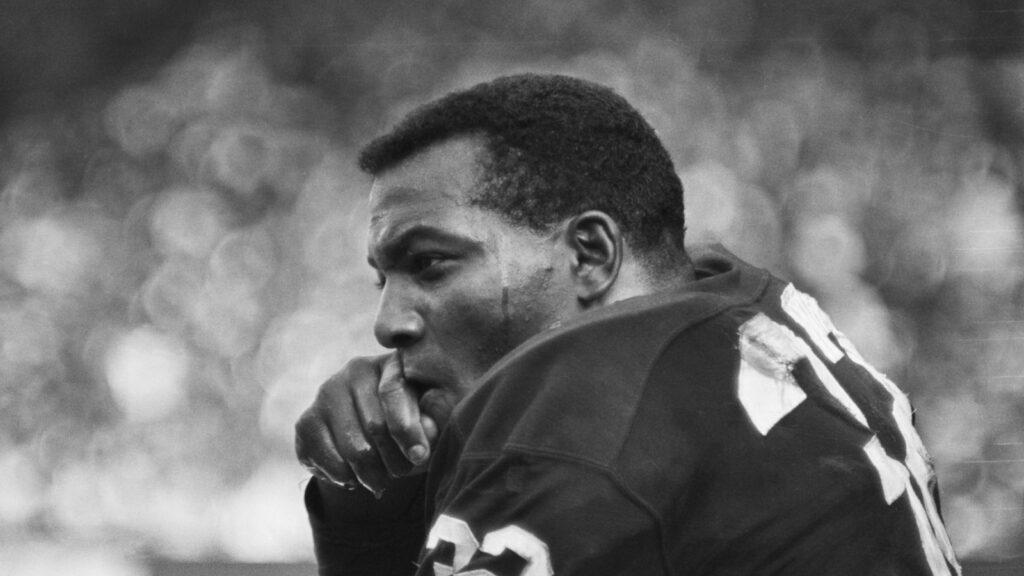
Jim Brown, NFL Legend, Actor, and Civil Rights Activist, Dead at 87
Jim Brown, the legendary NFL running back, actor, and civil rights activist, who was also the subject of numerous allegations of violence, died Thursday night, May 18. He was 87.
Brown’s wife, Monique, confirmed his death in a post on Instagram, though no cause of death was given. “It is with profound sadness that I announce the passing of my husband, Jim Brown,” Monique Brown wrote. “He passed peacefully last night at our LA home. To the world he was an activist, actor, and football star. To our family, he was a loving and wonderful husband, father, and grandfather. Our hearts are broken.”
Brown was one of the most accomplished football players of his generation. After a successful college career at Syracuse University (where he also excelled in basketball, track, and lacrosse), he was drafted by the Cleveland Browns in the first round of the 1957 NFL draft. He quickly started setting records, rushing for 237 yards in the ninth game of the season, an overall single-game record that stood for 14 years, and one for a rookie that lasted until 1997.
Brown stayed in Clevelent for his entire nine-year NFL career, helping to deliver a pre-Super Bowl era NFL Championship in 1964 (the Cleveland Browns haven’t won an NFL league title since). Along with winning Rookie of the Year, Brown was named the NFL’s MVP three times and chosen for the Pro Bowl every season he was in the league. When Brown retired in 1965, he held a plethora of NFL rushing records, some of which have been broken since, others of which have not. In 1971, he was inducted into the Pro Football Hall of Fame.
After retiring, Brown worked as an actor, appearing in over 30 films. Among his most famous parts: A role in the World War II action flick, The Dirty Dozen and a starring part in 100 Rifles, a Western that was one of the first major Hollywood films to feature an interracial romance (Brown starred opposite Raquel Welch). Brown continued to act through the Eighties and Nineties, popping up in flicks like the Arnold Schwarzenegger-starring 1987 film The Running Man and the 1999 football film, Any Given Sunday.
Brown was also a prominent civil rights activist, and helped organize the famous 1967 “Ali Summit,” after Muhammed Ali announced he would not fight in the Vietnam War. The meeting and subsequent press conference — which largely centered around voicing support for the embattled Ali — featured some of the most prominent Black athletes of the day, including Bill Russell, Kareem Abdul-Jabbar (then known as Lew Alcindor), Willie Davis, and John Wooten.
There was a small business conservative bent to a lot of Brown’s advocacy. He prioritized economic self-sufficiency as a means of uplifting Black communities and fighting racism, which even led him to endorse Richard Nixon in the 1968 presidential election. Decades later, he would voice his support for Donald Trump and was notably present for that infamous 2018 White House meeting between Trump and Kanye West.
As The New York Times notes, Brown also faced numerous allegations of violence and abuse, especially toward women, over the course of his life. He was first arrested in 1965 when an 18-year-old woman said he assaulted her at a Cleveland motel; Brown denied the allegations, and a jury cleared him the following year. In 1968, police suspected Brown of throwing his then-girlfriend, Eva Bohn-Chin, off his second-story balcony; she said she fell and refused to testify, so the charge was dismissed.
Brown did admit to slapping Bohn-Chin and “other women” in his book, Out of Bounds (via the Los Angeles Times). He seemed to express some regret over his actions, saying he “never should have” slapped anyone and “I don’t think any man should slap a woman. In a perfect world, I don’t think any man should slap anyone … I don’t start fights, but sometimes I don’t walk away from them. It hasn’t happened in a long time, but it’s happened, and I regret those times. I should have been more in control of myself, stronger, more adult.”
Though Brown was arrested numerous times, he was never convicted of a major crime. He served jail time in the early 2000s after losing an appeal over a misdemeanor vandalism conviction in 1999. The conviction stemmed from a claim that his wife, Monique, had called the police to report that Brown had taken a shovel to the windows of her car after an argument.



